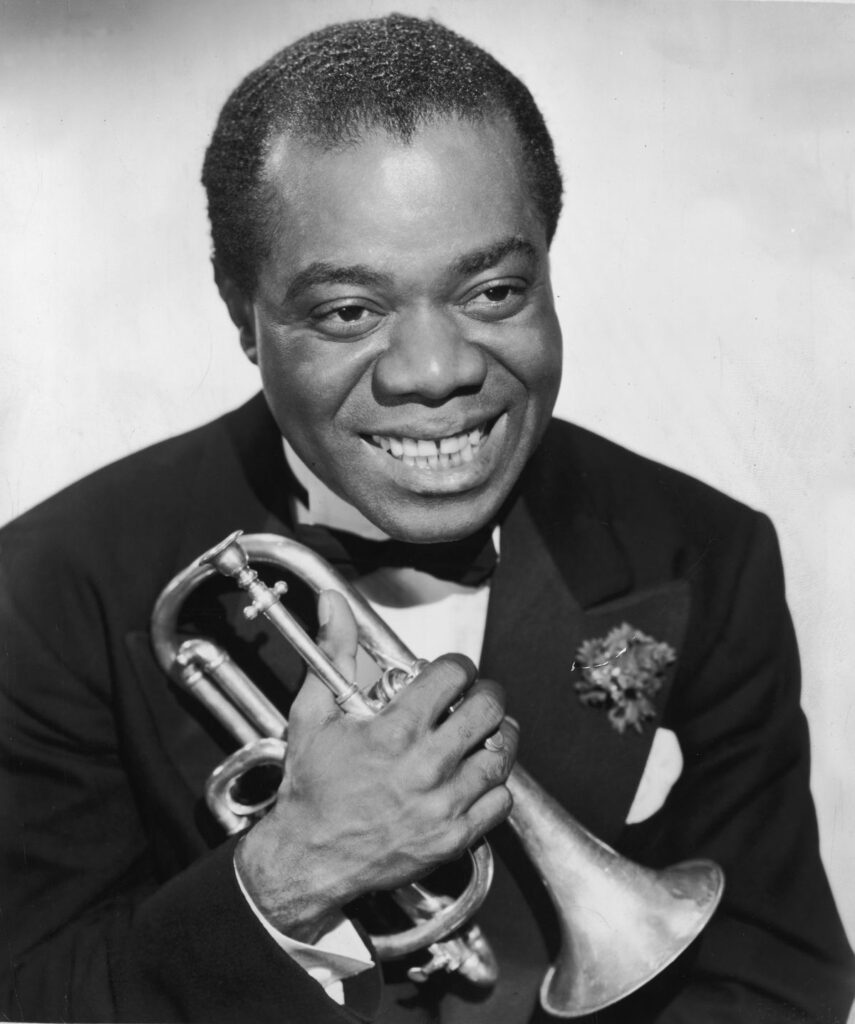Louis Armstrong, affectionately known as “Satchmo” or “Pops,” is a towering figure in the history of jazz. His innovative trumpet playing and gravelly voice brought jazz to new heights and left an indelible mark on music worldwide. Here’s a look at his top 10 songs that have become timeless classics:
1. What a Wonderful World
Released in 1967, “What a Wonderful World” is one of Armstrong’s most beloved songs. Despite its initial lukewarm reception in the U.S., it became a global hit. Written by Bob Thiele and George David Weiss, the song’s optimistic lyrics and Armstrong’s tender vocal delivery offer a heartwarming view of the world, capturing the essence of his hopeful and joyous outlook on life.
2. Hello, Dolly!
Armstrong’s 1964 rendition of “Hello, Dolly!” became a major hit, dethroning The Beatles from the number one spot on the Billboard Hot 100. This title song from the musical of the same name showcases Armstrong’s charismatic voice and playful performance style. His version brought the song massive popularity and contributed to the revival of his career in the 1960s.
3. West End Blues
“West End Blues,” recorded in 1928, is a landmark in jazz history. Armstrong’s opening trumpet solo is one of the most famous and influential in the genre, demonstrating his technical mastery and emotional depth. The song is often cited as a perfect example of his ability to blend virtuosity with a soulful, bluesy feeling.
4. La Vie En Rose
Armstrong’s 1950 cover of Edith Piaf’s “La Vie En Rose” is a beautiful fusion of jazz and chanson. His trumpet playing and distinctive vocal interpretation add a new dimension to this French classic, making it one of the most romantic pieces in his repertoire. The song has since become a jazz standard.
5. St. Louis Blues
Armstrong’s 1929 version of “St. Louis Blues,” featuring blues singer Bessie Smith, is another seminal recording. This song, written by W.C. Handy, blends blues with jazz, and Armstrong’s dynamic trumpet playing brings an energetic yet mournful quality to the piece. His performance here showcases his skill in accompanying and enhancing vocalists.
6. Ain’t Misbehavin’
“Ain’t Misbehavin’,” recorded in 1929, highlights Armstrong’s talent as both a singer and a trumpet player. His playful vocal style and vibrant trumpet solos bring Fats Waller’s composition to life. This recording has become one of the quintessential versions of this jazz standard.
7. Mack the Knife
In 1956, Armstrong recorded a memorable version of “Mack the Knife” from Kurt Weill and Bertolt Brecht’s “The Threepenny Opera.” His playful interpretation and distinctive gravelly voice add a unique charm to the song, which tells the tale of the nefarious Macheath.
8. When the Saints Go Marching In
Armstrong’s rendition of “When the Saints Go Marching In” is one of the most famous versions of this traditional gospel song. Recorded in the 1930s, Armstrong transformed it into a lively jazz standard. His joyous trumpet playing and energetic performance make it a celebration of music and life.
9. Potato Head Blues
Recorded in 1927, “Potato Head Blues” is one of Armstrong’s greatest contributions to jazz improvisation. His virtuosic trumpet solo in the middle of the track is particularly notable for its rhythmic complexity and inventiveness, making it a favorite among jazz enthusiasts.
10. On the Sunny Side of the Street
Armstrong’s 1930s version of “On the Sunny Side of the Street” exemplifies his ability to bring warmth and optimism to his performances. His cheerful trumpet lines and buoyant singing turn this standard into an uplifting and memorable piece that reflects his positive spirit.
Conclusion
Louis Armstrong’s top 10 songs offer a glimpse into his extraordinary musical talent and his role in shaping jazz. From his groundbreaking trumpet solos to his endearing vocal performances, Armstrong’s music continues to inspire and bring joy to listeners around the world. Each song reflects his unique ability to convey deep emotion, technical brilliance, and infectious joy, solidifying his legacy as one of the greatest musicians of all time.


No responses yet